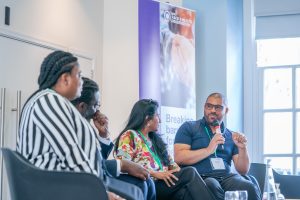There are three strands to the Observatory’s model, all of which are vital in the pursuit of racial equity in health for patients and workers. At every stage of our operating model, we include the voices of people with lived experience of racism and discrimination to ensure that the work we do meets the needs of the people it is designed to help and empower.
EVIDENCE – Synthesise, signal-boost, and validate existing evidence, making it more accessible to a broader audience. We fulfil a bridging role by making evidence relevant to changemakers and decision-makers. We also fill evidence gaps by strategically commissioning original research.
INFLUENCE – We use evidence and intelligence to support and influence policymakers and decision-makers through thought leadership, strategic engagement with leaders, and the championing of new approaches to community participation, working internationally to develop and spread good practice.
IMPLEMENT – We implement and support the implementation of anti-racism practice by demonstrating what effective interventions look like and how they can be replicated, working in partnership with providers, patients, and the public.
Across all of the above work areas, we are supported by a strong strategic communications function, using traditional and social media channels to build awareness of our work and of racial health inequity more generally; to empower racialised communities; to find and cultivate new audiences for our work; and to build a coalition of actors to help drive race equity in health.

Our Approach to Commissioning
A core part of our operating model involves commissioning research from external organisations, enabling us to always involve the best people possible in the work that we do and to ensure high quality outputs that represent good value for money for taxpayers. We will do so openly and transparently, making every effort to procure work from a diverse range of organisations.
In practice, this means involving lived experience at every stage of our commissioning process:
- Before commissioning work, we identify our research priorities by drawing on the intelligence of diverse specialist advisory groups, engaging with a diverse range of community groups, and drawing on the expertise of external individuals and organisations.
- When we tender for research, we co-design the project brief with our advisory groups and advertise the opportunities as broadly as possible, using social media and targeted circulation to ensure that underserved groups are aware of the opportunities.
- We make genuine community participation and validation a fundamental pre-requisite of all of our research commissions.
- When we shortlist and interview prospective research organisations, we ensure that we have diverse panels that include people with lived experience relevant to the project at hand.
- Before we finalise research outputs, we ensure that all conclusions and recommendations are validated by people with relevant lived experience.
Conflicts of interest
We are committed to identifying, managing, and mitigating conflicts of interest to uphold transparency, fairness, and ethical practice.
For more information please see our conflict of interest statement.
Remittance policy
We are commited to ensuring that all of our activity is informed by those with lived and learned expertise of the inequity we were established to tackle – expertise that must be equitably compensated.
For more information please see our remittance policy.
